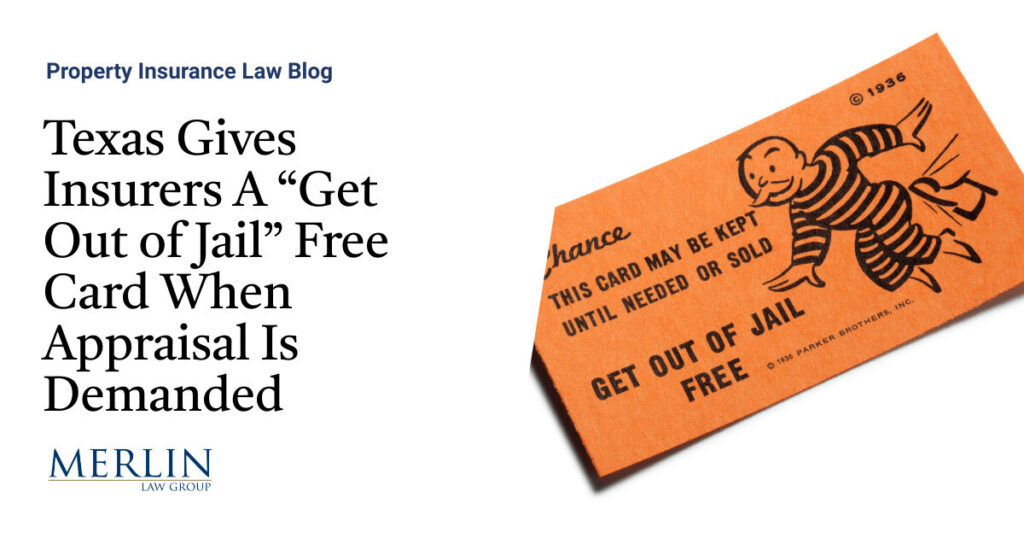Texas Gives Insurers A “Get Out of Jail” Free Card When Appraisal Is Demanded

Steve Badger and the entire Texas insurance industry are pleased as Texas punch that insurance companies are immune from bad faith accountability when an insurer has caused these facts:
On July 21, 2021, more than two years after the tornado and exactly one year after Safeco answered the lawsuit, Safeco invoked the Policy’s appraisal provision. Mr. Rodriquez incurred an additional $4,302.39 in expenses for his appraiser and the umpire. On April 5, 2022, the appraisal panel determined the replacement cost value of the damage to Mr. Rodriquez’s dwelling to be $36,514.52 – more than twenty-eight times Safeco’s $1,295.55 estimate and roughly $7,000 or 25% more than the amount stated in the pre-suit [demand] to which Safeco did not respond.1
The insurance company’s outcome-oriented engineer even doctored a report to hide the high wind areas striking the home.
The Texas Supreme Court ruled the following:
When it applies, Chapter 542A changes the rules applicable to the litigation of certain statutory and common-law claims against insurers, including claims asserting violations of Chapter 542’s prompt-payment requirements…We understand the parties to agree that Chapter 542A governs Rodriguez’s claims.
Among its many other provisions, Chapter 542A limits the recovery of attorney’s fees. Rodriguez acknowledges that section 542A.007’s restrictions on attorney’s fees apply to his claims. He likewise does not dispute that Safeco has paid the full appraisal amount plus interest. With these undisputed matters established, we understand the Fifth Circuit to ask a purely legal question about Chapter 542A’s effect on the availability of attorney’s fees: Does Chapter 542A prohibit the recovery of attorney’s fees when an insurer in Safeco’s position has paid the full appraisal award plus any possible statutory interest? The answer is yes.
We need not and should not seek the answer from any source other than the statute’s plain language. The Legislature’s ‘voted-on language is what constitutes the law….’2
The illogic of judge-made and statutory law comes from the small print found in all insurance companies about the timing of when payment is due. The vast majority of all property insurance policies say words to the effect that an insurance company does not have to pay policy benefits until 60 days after one of three things happens. First, they reach an agreement with the policyholder on the amount of the loss. Second, an appraisal award is entered. The third is that a judgment is entered. These policy provisions have nothing to do with whether the insurance company acted in good faith or breached the policy by not paying the amount timely. Indeed, the insurance company could pay millions more after five years of litigation and then say they “timely paid” the policy benefits because the policy does not require them to pay until 60 days after a judgment.
It is stupid to get caught up in this “time of payment” provision. If the policyholder has met its post-loss obligations and the insurance company fails to pay the full amount owed because it failed to determine the correct amount, it has breached the fundamental obligation and purpose of the contract—payment of insurance benefits. Under the new Texas statutory law, insurance companies can demand appraisal and escape accountability for the most atrocious bad faith behavior.
I have a lot of respect for Steve Badger. I suggest that people read his comments on LinkedIn about this case. In my private comment to him, I tried to show why the logic of the opinion and the interpretation of current Texas law is so flawed:
… an insurance company can deny a claim saying that the insured is black and Islamic, do nothing or intentionally delay the claim, and you buy your way out of all that bad faith conduct by belatedly paying an appraisal award. Pretty sad public policy. Stupid logic.
Steve Badger filed an individual amicus brief to the Texas Supreme Court in this case reflecting his concerns, which all can read.
The bottom line is that Texas had a 100 year history of holding a Texas insurer accountable when it acted in bad faith and failed to timely pay a policyholder full benefits after the policyholder satisfied all conditions precedent to recovery. Current case and statutory law no longer hold insurers accountable when that occurs so long as the insurer demands appraisal and pays the appraisal award within 60 days.
This is like a member of the mafia knowing bad things can be done but all forgiven by timely going to confession. Indeed, there is not even a penance requirement for the bad-acting insurer.
Thought For The Day
If you are neutral in situations of injustice, you have chosen the side of the oppressor. If an elephant has its foot on the tail of a mouse, and you say that you are neutral, the mouse will not appreciate your neutrality.
— Archbishop Desmond Tutu
1 Rodriguez v. Safeco Ins. Co., 23-0534, 2024 WL (Tex. 2024).
2 Rodriguez v. Safeco Ins. Co., — S.W.3d —, 2024 WL 388142, at *3 (Tex. Feb. 2, 2024).





